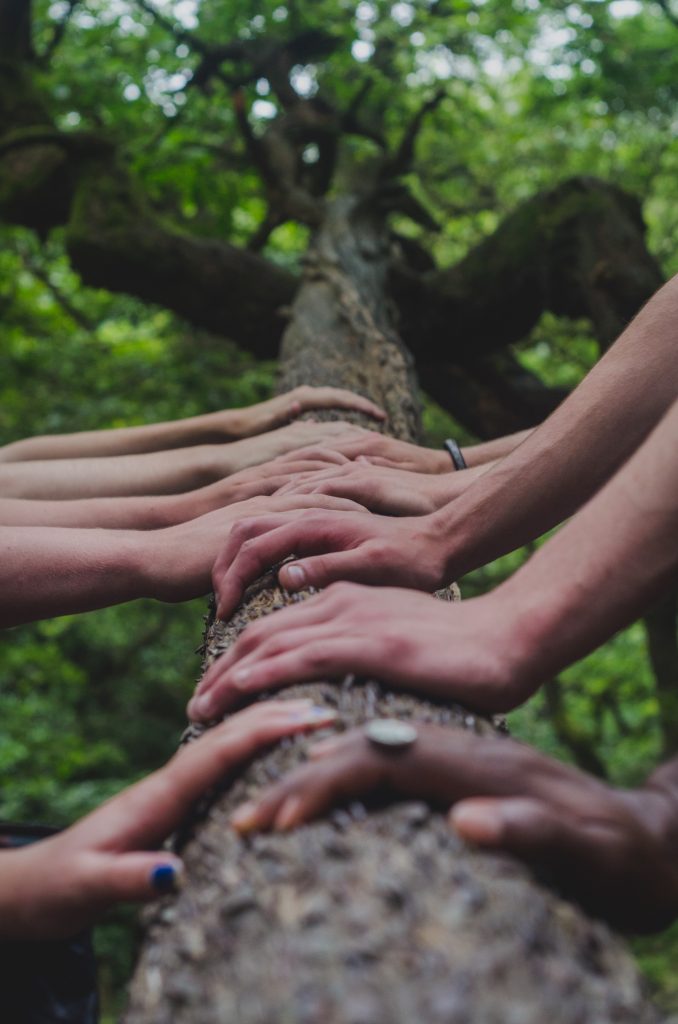For those with eyes to see, we cannot continue to myopically regard everything as merely “capital” and trust that capitalism will save the day. Nor can we rely on fully embracing the tenets of communism or socialism any more than we can look forward to reverting to feudalism. Although we may not yet know the name of the economic construct that will deliver us from our addiction to imbalance, we know that something has to change.
“It is never possible to know in advance what may or may not occur,” says Gar Alperovitz in What Then Must We Do?: Straight Talk about the Next American Revolution. “Nonetheless, such a time is a time when it is also our responsibility to begin to consider the fundamental question of how a ‘next system’ might and should be organized, a time to begin to explore new ways to achieve the great American values that can no longer be achieved by the dying system.”
Every task we create is used to reach certain goals, and each goal is a human creation. We are now at a time in human history where actual democratic action is more possible than ever before, but we must reconsider the goals we have for our economy and act accordingly. Historically, many goals have been hijacked to merely increase financial development for the wealthy. Our focus has been guided toward the measurement of value and vain competitions, which has enabled the social disease that is greed to encourage hoarding and sociopathy. Moving forward, we would be wise to focus our energies on goals that would actually develop the sustainability, resilience, and quality of life the majority of us truly desire.
For quite a while, and especially since the dawn of capitalism, the accumulation of money seems to have become one of our key goals. So instead of regarding money for the currency that it is, it has thrown us off kilter by becoming the goal in itself.
“It’s critical to understand the definition of the word ‘currency’,” explains Bernard A. Lietaer in Rethinking Money: How New Currencies Turn Scarcity into Prosperity. “So for me currency is information between a buyer and a seller… Money is not valuable at all, but money allows you to buy things, which are valuable. This distinction should be understood. And it’s not generally known or appreciated by most people.”
Unfortunately, instead of understanding money better and empowering it to flow as it should, we have largely become consumed with the competition for it. Although we often herald money as the bringer of convenience and prosperity, due to our methods of venerating those who have the most unhealthy cravings for it, money has somehow come to represent the scarcity and lack it was supposed to overcome.
“The strangest of all the doctrines of the cult of competition,” explains Wendell Berry in What Are People For?, “in which admittedly there must be losers as well as winners, is that the result of competition is inevitably good for everybody, that altruistic ends may be met by a system without altruistic motives or altruistic means.”
Historically, violence, hierarchy, patriarchy, and competition have dominated the story humanity tells itself. This has indeed been an immature understanding of who we actually are and a devastating limitation on our potential. As humanity continues to evolve and our civilization changes, we are realizing the sheer folly behind many of these antiquated programs, and many are awakening to their power to tell the story of abundance, collaboration, equality, and connection that our technologies and innovations have empowered.
As Geoffrey West explains in Scale: The Universal Laws of Growth, Innovation, Sustainability, and the Pace of Life in Organisms, Cities, Economies, and Companies, “We need to understand how the dynamics of innovation, technological advances, urbanization, financial markets, social networks, and population dynamics are interconnected and how their evolving interrelationships fuel growth and societal change – and, as manifestations of human endeavors, how they are all integrated into a holistic interacting systemic framework . . . and whether such a dynamically evolving system is ultimately sustainable.”
Moving forward into the economy we seek, we would be wise to look at the natural economy of the planet we’re on and recognize how it is distributive and regenerative by design, unlike the divisive and degenerative nature of our man-made economic model of rewarding the insanity of relentless competition at all costs. If we want to build a model of sustainability, Mother Nature has done an extraordinary job of creating a number of really helpful examples.
“Systems biologists find that the healthy functioning of any living system depends on collaboration,” says David Korten in Change The Story, Change The Future: A Living Economy For A Living Earth. “Most all living organisms exist, thrive, and co-evolve only within living communities engaged in a continuous synergistic sharing and exchange that from a big-picture perspective is fundamentally cooperative.”
If we are to make an economic system sustainably, it must be based on collaboration, in which prosperity can be shared throughout the populace, instead of continuing to base it on competition to ensure that only the most ruthless, selfish, and uncaring thrive. In order for a currency to be fully functional, whether that currency be the Federal Reserve Note or any of the other national, complementary, or digital currencies being developed, it must properly distribute the energy that the currency represents and help it to circulate. If money is the lifeblood of a society, if it does not circulate properly, as we have seen, disease sets in.

This is an excerpt from Steve McAlphabet Explains ABC Squared Economics. Find out more.

